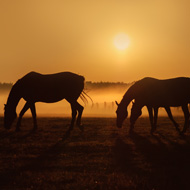
LAMP test provides results in an hour, Pirbright scientists say
Scientists at the Pirbright Institute have developed a field test for African horse sickness (AHS) which could help to control the spread of the disease.
AHS is a viral disease that infects all equines and is often fatal in horses and mules. Over the past century, outbreaks have impacted the Iberian and Arabian Peninsula, the Middle East, Indian subcontinent and northern African countries.
Better diagnosis in the field is paramount to controlling spread of the disease, scientists say. While current tests used by the World Organisation for Animal Health (OIE) have allowed for improved speed and sensitivity, they are limited to the laboratory setting - therefore, there are delays in diagnosis while samples are sent away.
According to Pirbright, the new test provides results in an hour and is portable, cost effective and easy to use. For the first time, the team used 'loop-mediated isothermal amplification' (LAMP) to detect AHS in samples.
Their findings have been published in Transboundary and Emerging Diseases.
The test is within the same range of sensitivity and specificity as laboratory tests but is slightly less sensitive than the test recommended by OIE. Pirbright scientists believe it could be a valuable complementary tool to laboratory testing.
Explaining the importance of field tests, the research team said: "This capacity would enable the faster implementation of containment procedures within affected areas, which is of paramount importance for the control of outbreaks of African horse sickness."
Quick and effective measures for controlling AHS are critical for the international trade of horses, as well as reducing the global threat to equine industries.
Rapid diagnosis could also "lead to the immediate application of appropriate therapeutic interventions," they added.



 Zoetis has launched a new survey to identify management techniques for Equine Herpes Virus (EHV).
Zoetis has launched a new survey to identify management techniques for Equine Herpes Virus (EHV).